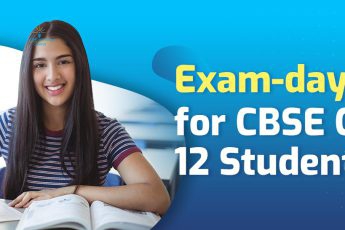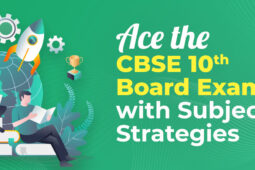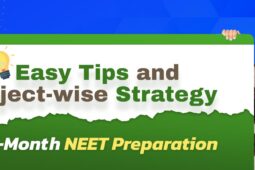Tips to Prepare for Class 12 Commerce CBSE Board Exam
Commerce is very popular among the three streams in India and is opted for by maximum students. They aspire to be a CA, CS, a Banker, a Financial Manager, and other career options in the field. But, to pursue these, it is imperative to score high marks in the Class 12 Board exam. These will eventually decide your career path, helping you achieve your dreams. Hence, the preparation for this crucial exam has to be taken seriously. Here are some tips for Commerce 12th exam preparation, which will assure you of acing the exam and fulfilling your dreams.
Challenge yourself

Always challenge yourself and put in efforts to outdo your past endeavours. Let’s say you have secured 80% in your prelims, and you aim for a higher percentage, for example, somewhere between 85-90%. Your target must be to attain higher scores than the last exam. Also, focus on increasing the overall percentage over scoring in each individual subject.
Focus on the main syllabus
While studying from reference books, do focus on the main syllabus. Reference books, while a very good source of knowledge, can be daunting as well. Many students tend to ignore the main curriculum while giving more importance to reference books. According to experts, sticking to the main books is wise, and you must cover everything in it while studying. Even if you are referring to 12th Commerce guides, use the main syllabus books as your Holy Bible.
Focus on your weak areas
All of us have our strengths and weaknesses. Likewise, you may be good in certain subjects while weak in some. Or maybe, you are weak in some topics in a particular subject. Always work on these and strengthen them. Most students ignore the topics/subjects they are weak in, which is the biggest mistake. Instead, it helps to score marks if you spot your weak areas and make them into strong ones.
Previous years’ questions papers

It goes without saying that solving previous years’ question papers gives immense insight into what questions are likely to be asked in the exam. However, while solving these papers, time yourself like the actual exam and solve the entire paper in one sitting. Do not solve the paper in parts or take longer to solve it. Initially, you may not meet the timeframe, but eventually, you will. We suggest solving question papers of at least the past 10 years to gain accuracy, speed, and good time management.
Revision is a must
We cannot stress enough the importance of revision. Even if you have completed studying the syllabus and solving past years’ papers, revise each topic in each subject. To be able to do this, ensure that you complete preparing all the subjects about 2-3 months before the exam. Then, use this period only to revise. Diligently Revising will raise your confidence while also making you thorough in all subjects.
Following the above tips will help you in your preparation for the Boards. However, here are some more tips to aid you in your studies of Commerce subjects in Class 12.
Accountancy
- Journal entry is imperative and must be at your fingertips.
- Chapters like Cash Flow Statements, Partnerships, and Company Accounts are important, and you must focus on these.
- Understand the formulas and avoid rote learning them at all costs
- Knowing the formats of the Balance Sheet, Trial Balance, and Ledger is important. Presenting these in a proper format will garner good scores.
- Accountancy is all about practice. The more you practice, the better you get at it. Hence, solve as many previous years’ question papers as possible.
- The Theory is equally important as the practical. Focus on it as well.
- Working notes are important to support your answers wherever necessary. Thus, do focus on these as well.
Business Studies
- Remember that this is a completely theoretical paper, and hence, revision is important here. Or else, chances are you may forget many important topics/features.
- While revising, it is important that you cover the maximum chapters at the same time. This means that if you have completed and revised chapter 1 and now completed chapter 2 as well, revise both – Chapters 1 and 2 this time. Follow this method to revise all chapters.
- In Business Studies, most questions as your opinions. Hence, when you are asked, ‘Do you agree with this statement…’, you must start your answer with, ‘I agree with this statement because…’, to express your opinion. Remember, Cast Studies are always scoring and will fetch you high marks.
- Use points to present your answers as lengthy paragraphs are cumbersome for the examiner. Hence, these may not fetch you full marks.
Economics
- This subject is best prepared with handwritten notes as these are always easy to understand and revise. As the syllabus of this subject is very wide, your notes are your best bet while preparing for it.
- Macro and Microeconomics have many diagrams and though decent drawings are important, labeling them is also important.
- This subject also has many differences between terms and concepts. Hence, you must prepare the differences very well. You must also present them in a tabular form to differentiate them properly.
- We have mentioned this earlier, yet we are stressing it again. Solve previous years’ question papers as these will help you identify the paper pattern and its structure.
While you may have been studying diligently, use our tips as the online student’s guide to exams. Following them will ensure you score high marks in your Commerce Board exams. Besides, this way, you will also be a step closer to your dream career. Moreover, the above tips are not merely for preparation. They are revision tips for students before an exam, which will help them not only in this but also in all future exams they may take.















Leave a Comment